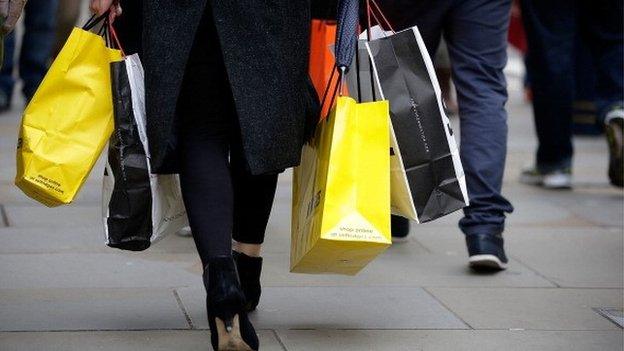Zero inflation means lower interest rates for longer
- Published
- comments

Last week the Bank of England's chief economist Andy Haldane told us that the next move in the official interest rate was at least as likely to be down as up - because of the growing risk that inflation would remain well below the 2% target for longer.
So what do inflation figures for February tell us about whether the greater danger is prices that are falling, deflation, or prices that are set to rise too fast?
Well with the official inflation figure announced as a big fat zero - the lowest since records were first properly kept - interest rates look set to be lower for longer, and the official Bank of England rate of 0.5% could even be nudged nearer nought.
So why has inflation vanished?
Well the Office for National Statistics says that the biggest contributors to the drop in inflation from a trivial 0.3% to 0% were food and non-alcoholic drinks, furniture and household goods, recreation and culture (books, games, toys, hobbies and "data processing equipment").
What is striking is that transport - the price of petrol and diesel - was not a factor this month in the drop in the inflation rate, because oil prices have risen a bit.
So the driver of falling inflation looks to be the strength of sterling, especially against the weakening euro - which is reducing the cost of imports.
The important point is that, for now at least, the fall in the price of food, games, petrol and energy, if it persists for a few months, is good news for most of us - because it increases our spending power and our pounds go further. In other words we feel and are a bit richer.
Bad deflation
But if stagnation in prices were to go on for longer, if it were to turn into fully fledged deflation, that would be worrying.
The point is that if we thought that the price of things we don't normally have to buy at any particular moment - household goods like washing machines for example, or motor cars - was on a firmly downward path, we would probably defer purchases of those things, and that would depress economic activity.
Robert Peston looks at the UK's record low inflation rates
We would be experiencing Japanese-style bad deflation, of the sort that can undermine prosperity for years and even (in Japan's case) decades.
Right now, we are some considerable way from bad deflation - although across the Channel the European Central Bank is increasingly anxious that pernicious deflation is the looming monster in its midst.
As for the Bank of England's Mr Haldane, his concern, which he said was a personal view, is that the relationship between growing employment and wage rises has weakened - such that the strength of the UK's economic recovery and the fall in unemployment might not be leading to sufficiently rapid wage growth that would force inflation back to target.
So in other words the big test of whether this is good or worrying deflation will come in the next few weeks, when a disproportionate number of employers decide what they are going to pay their people over the coming year.
Or to put it another way, any signs that a slight weakening in wage growth, seen in the last official figures, is becoming a trend would mean there is slim chance of an interest rate rise till the autumn of 2016 or later - and there could even be more quantitative easing (creation of money) and an interest rate cut.